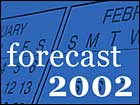|
Can burned-out consumers revive 2002?
|
 |
January 16, 2002: 7:24 p.m. ET
J.P. Morgan's Cliggott forecasts zero growth in earnings this year.
By Money magazine senior writer Suzanne Woolley
|
NEW YORK (CNN/Money) - Doug Cliggott has lived through tough markets before -- but nothing that compares with today's. It was different in the market break of 1987, says J.P. Morgan's chief equity strategist, since investors split their portfolios pretty evenly between stocks and bonds at that time, and the big bond rally in the late 1980s helped offset the damage from the stock market. During the recession of the early 1990s, Cliggott was abroad.
"So even though I'm 45 and have been in the industry for about 20 years, this is new and different," he admits.
He's not alone. "The vast majority of people in the market don't know that recessions can linger for a while," he says. "There's a high degree of comfort with the idea that very soon things will be looking and feeling a whole lot better."
Cliggott hopes that view is right -- but he doesn't think it is. He simply can't put his finger on just what is going to get growth going again.
"Earnings are supposed to be up 10 percent by the second quarter of 2002 if you look at the consensus numbers," he says. "But our guess is that they'll be down about 10 percent by the second quarter of 2002."
One of the things making Cliggott so tentative is that the whole world is depending on the shopped-out, tapped-out U.S. consumer. J.P. Morgan's auto and retail analysts say that since autumn 2001, consumers have been spending only when they find a screaming buy. So, sure, revenue growth may be good next year, but if there's no pricing power it does a company's earnings little good. That's the main reason Cliggott forecasts zero growth in earnings for 2002.
Cliggott is going through the market sector by sector, searching for areas where he thinks share prices haven't been inflated by overly ambitious earnings expectations. That leads him to health care and consumer staples. Pharmacia and HCA are favorites in health care, while General Mills and PepsiCo are consumer picks.
"These are your classic defensive pieces of the market -- you're going to go to the doctor, the supermarket, the pharmacy, whether we're in a recession or not," says Cliggott.
In case his outlook proves too pessimistic, Cliggott is also recommending a few energy stocks. "The one cyclical area where earnings expectations are really low now is energy," he explains. With the consensus expecting energy sector earnings to drop 25 percent in 2002, a "pretty crummy outcome" is priced into the stocks. So the risks are low. If Cliggott is wrong and the economy does better than expected, "energy is probably the place in the market with the most upside relative to the current guess at earnings," he says. Two favorites are Marathon Group and Valero Energy.
Cliggott's bottom line: "We're clearly in an environment in the economy and the market where volatility can be extreme. The only real defense is to diversify across asset classes and within asset classes." 
|
|
|
|
|
|

|

